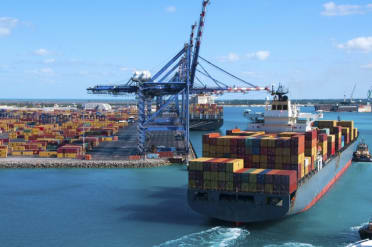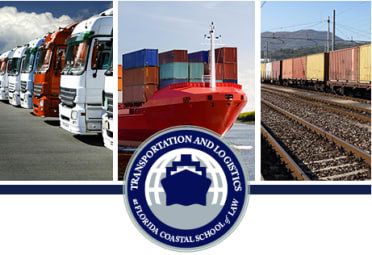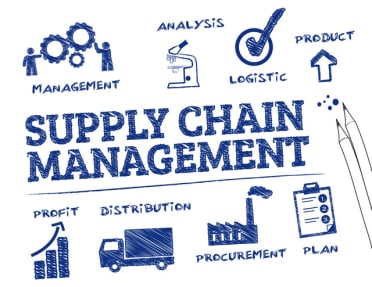This Form of Law Continues to Apply to Transportation
 With the logistics and transportation industry growing at a staggering rate of 23 percent every 10 years, the next few years will see a giant leap in the need for qualified workers in this field. In particular demand? Legal experts. Read on to find more about the dynamic logistics and transportation industry, along with why advanced law studies in this area can help set you on the path to a fulfilling and sought after career.
With the logistics and transportation industry growing at a staggering rate of 23 percent every 10 years, the next few years will see a giant leap in the need for qualified workers in this field. In particular demand? Legal experts. Read on to find more about the dynamic logistics and transportation industry, along with why advanced law studies in this area can help set you on the path to a fulfilling and sought after career.
The Role of Logistics and Transportation Law

While transportation and logistics have both been around -- albeit in more primitive incarnations -- since the beginning of man, the industry is rapidly evolving to keep up with the increasingly global environment.
So what role does the law play in logistics and transportation? As globalization continues its juggernaut, government regulations -- both national and international -- are becoming more prevalent. Companies seeking to remain compliant will require the guidance of workers with legal training. Not only that, but while it used to be sufficient to specialize in one area or another -- trucking or maritime law, for example -- the rise of intermodal transportation is amping up the need for lawyers skilled in the full spectrum of logistics and transportation law.
Another factor in the changing field of transportation and logistics? The need for sustainable energy alternatives and reduced CO2 emissions. Navigating government initiatives inspired by global climate change will further mandate the need for lawyers with expertise in this field.
What are Logistics and Transportation?
 "Logistics management" is defined as, "that part of supply chain management that plans, implements, and controls the efficient, effective forward and reverse flow and storage of goods, services and related information between the point of origin and the point of consumption in order to meet customers' requirements," according to the Council of Supply Chain Management Professionals (CSCMP).
"Logistics management" is defined as, "that part of supply chain management that plans, implements, and controls the efficient, effective forward and reverse flow and storage of goods, services and related information between the point of origin and the point of consumption in order to meet customers' requirements," according to the Council of Supply Chain Management Professionals (CSCMP).
Underneath the umbrella of logistics falls transportation, which simply refers to the physical movement -- or flow -- of goods. In other words, transportation is the linking of supplies with the consumer supply chain.
 There are several main modes of transportation, including air, water, rail, motor carrier and pipeline. Each has its own sets of advantages and disadvantages when it comes to speed and cost. Typical measures of performance in transportation include product availability, order preparation time, transit time, whether goods are shipped on time and complete, and the efficiency and accuracy of billing.
There are several main modes of transportation, including air, water, rail, motor carrier and pipeline. Each has its own sets of advantages and disadvantages when it comes to speed and cost. Typical measures of performance in transportation include product availability, order preparation time, transit time, whether goods are shipped on time and complete, and the efficiency and accuracy of billing.
In short, while logistics involves getting items where they need to be, when they need to be, in the ideal condition and at an optimal price, transportation determines the best way to move the items from supplier to site.
What Do Transportation and Logistics Lawyers Do?
 Essentially, transportation and logistics lawyers respond to legal needs across the complete international supply chain in order to quickly and cost-effectively resolve any rising needs or issues.
Essentially, transportation and logistics lawyers respond to legal needs across the complete international supply chain in order to quickly and cost-effectively resolve any rising needs or issues.
Their responsibilities comprise a broad knowledge of the law, including regulatory advice and counsel, commercial and financial advice, contract management, insurance/risk management, and state and federal lobbying. Additionally they may also end up in litigation cases. Among many others, their specific duties may include:
- managing contract and insurance documentation for client shippers
- representing clients in negotiations with trucking, brokerage and LTL companies
- representing clients in international shipping matters, including border crossing issues, customs, and freight forwarding
- keeping up with pending transportation legislation and advising clients on these matters
- representing international airport authorities in matters of everything from debt issuance to rental car agreements to construction matters to aviation regulatory and compliance matters.
- representing both trucker dealers and jet aircraft sales/broker companies in operations, expansions, and acquisitions
Leading the Way

Aimed at preparing students to enter the evolving logistics industry in the world market, the program focuses on four major areas pertaining to both domestic and international transportation: maritime law, trucking and rail law, aviation law and military logistics in the areas of litigation, regulation, contracting, and public policy. Unlike in the past, students are not limited to a single area in order to prepare them for today's intermodal transportation industry.
 Because most transportation today is intermodal, students are not limited to one topic area. Furthermore, understanding international trade is a critical part of the curriculum.
Because most transportation today is intermodal, students are not limited to one topic area. Furthermore, understanding international trade is a critical part of the curriculum.
Florida Coastal School of Law offers transportation and logistics programs for two types of students:
- the 14-month Master of Law degree (LL.M.) for students with pre-existing law degrees who are interested in advancing their knowledge in this vital field.
- the 7-month Certificate Transportation Regulation (C.T.R.) for workers with bachelor's degree and significant industry experience.
With the transportation and logistics industry growing at exponential rates, workers with adequate training will not only be prepared to navigate the changes ahead, but also to guide the industry's ongoing evolution. An LL.M. will position you for optimal success as a rare and in demand legal expert in the field.
hatfielddouse1959.blogspot.com
Source: https://www.masterstudies.com/article/Why-Study-Logistics-and-Transportation-Law/
0 Response to "This Form of Law Continues to Apply to Transportation"
Post a Comment